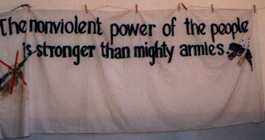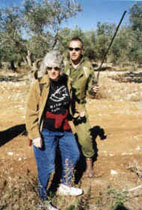Jerusalem
3 January 1999
Subject: Rifle Grenade #400

For months, the pace of demolition of Palestinian homes had slowed, and human rights activists dared hope that this scourge had passed. Last Monday’s events, unfortunately, proved us wrong. In the bucolic Palestinian village of Kifl Harith, Israeli soldiers were as awful as they have ever been against an innocent civilian population. Defying the Fourth Geneva Convention on human rights, as well as elementary decency, two families were violently evicted from their homes, which were then razed to the ground. The army had also used African guest workers to remove some basic possessions from the houses before the bulldozers did their work.
The homes and most of the contents, however, were utterly destroyed.
The Israeli Committee Against Home Demolitions, in which several peace organizations participate (Bat Shalom, Gush Shalom, Peace Now, and Rabbis for Human Rights), called for a rebuilding of these homes, and the weekend had been set aside to begin. The army, however, had learned this technique, and declared the village a “closed military zone,” prohibiting anyone from entering or leaving. Roadblocks were set up at the two entrances to the village, and soldiers patrolled the village perimeter. The villagers were virtually imprisoned in their own tiny area: none in, none out.
A group of about 100 of us from Jerusalem and Tel-Aviv — Israelis and internationals — gathered opposite the village at about noon, determined to hold a demonstration, even if we would not be able to begin the reconstruction. Quite visible in the hills across from us, about 3 kilometers away, were the luxurious homes, buildings, and swimming pools of Ariel, a large Israeli settlement. Ariel settlers have no trouble getting building permits, and enjoy generous government mortgages, loans and grants. In addition, Ariel residents receive significant income tax benefits just for living there (as do all Israeli settlers). Across the road in Kifl Harith, not a single building permit has been issued in the past 30 years, and the village has no paved roads, sewage system, or other basic amenities. The contrast is shameful, shameful, shameful. I say this as an Israeli.
The group of peace and human rights activists gathered at an access point leading into the village and demanded entry. The soldiers blocked our way and demanded that we leave. Our large group began to walk along the main road toward another access point, knowing full well that we would be blocked. Suddenly, Gail from Jerusalem broke rank and began to walk across the field toward the village. It seemed so simple, and a group of us followed her, spreading out to make it harder for the soldiers to stop us.

When we came out on the other side, we discovered — by chance or not — that we were all women who had taken the risk and gotten through to the village. It gave us food for thought. Together, we walked to the site of one demolition and found the families and neighbors gathered outside the tent in which the family of four now lived. Husam the father, a slight, soft-spoken man, spoke to us as his four-year-old son maintained a tight clutch on his pants. He described how five tear gas canisters were lobbed into the home to evict them and their neighbors, who had hunkered down inside. In the ensuing chaos and escape from the fumes, the two-year-old had been left behind until the father raced back in, emerging with his child unconscious from smoke inhalation. Was this the only way to remove unarmed adults and infants from their home?
The mother took us on a “tour” of her former home, now a shattered dream of broken concrete and twisted pipes. She explained the difficult economic straits — that her husband could not get a permit to work inside Israel because he was under 30, and the authorities don’t issue permits to young men, viewing them as more likely to be terrorists than older men. With the two-year-old in her arms, she reached down in the rubble and picked up something that looked like a hand grenade. “Rifle grenade #400” was printed on it in English. The smell of gas still lingered on it, but the child did not know enough to be afraid.
As we listened, we noticed a commotion down the road, and saw that some of the village young men had placed rocks across the dirt road to prevent army vehicles from entering their village. This is like a red flag to the Israeli army, with its proprietary message, “This place is ours, not yours!” Soldiers suddenly appeared in the distance and raised their weapons toward us, moving ominously forward. Several Israeli women quickly moved out to be visible to the soldiers, and one (I wish I knew her name) shouted across to them, “Hey, guys, cool it, don’t shoot, we’re just having a little talk here.” My heart was in my throat, but they didn’t shoot. Then one of the Palestinian young men wrapped a scarf around his face and began the motions of releasing his sling shot at them with a heavy rock inside. “Put it down,” we told him, and were relieved when he lowered his arms and moved back toward the village.
Now we were joined by a group of CPTers (Christian Peacemakers Team), who had circled around the village and entered from the back. By cell phone, we called the group outside and were told that, following negotiations with the army, a delegation would be allowed through. Within an hour, we saw a group walking toward us along the access road — Jeff Halper and Amos Gveertz of the Coalition, Uri Avnery of Gush Shalom, Ya’akov Manor of Peace Now, and others. (It was a striking contrast that the self-appointed delegation was almost all men, though it was only women who had shown their mettle and initially broken through.) The village dignitaries met them warmly and gave them the tour as well. Then all of us constructed a symbolic wall at the site of one of the demolished walls, and pledged to return to help with the actual construction. We then left peaceably — returning to our own comfortable houses.
Israel TV did show a segment of our demonstration on the main road, but all the media, foreign and local, were prevented by the army from entering the village today. This is the way oppression is maintained — by keeping it out of sight. Many of us, however, have recorded it in words and photos. It must be documented in history, engraved in our hearts, and spoken about in the world at large. This is a task not for those who wish to speak evil of Israel, but, first and foremost, for those who love it.
Please do your best to tell the world that the demolition of Palestinian homes is intolerable and must be halted.
Gila Svirsky